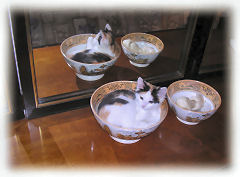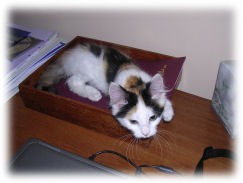Why Do Cats Purr?
I was awaken early this morning (as is often the case) by the tickle of Suzy Q's whiskers on my nose and the drone of her purr in my ears. Translation: "Time to play cat and mouse!"

Now, Q could hiss or growl or meow. Instead, she purrs. So here I am at 5:55 in the morning trying to answer the burning question of why a cat purrs. The answer is, we don't know for sure.
Cats first purr as a kitten while nursing. In fact, a kitten can purr before it can meow. Later in life, they purr when under stress, during sexual intercourse, when injured or ill and at death. Cats also purr when you pet them (sometimes), you are about to fed them and, of course, when they want you to wake up and play with them at 5:00 in the morning.
Purring occurs while the cat's mouth is closed. The sound, having a frequency of 25 to 150 Hz, is created by the movement of air in spasms through contractions of the diaphragm and occurs while both inhaling and exhaling. Some scientists believe purring is caused by the release of morphine-like substances (endorphins) in the brain. These endorphins, released under circumstances of pain and pleasure, activate one of the main action systems in the brain (so thought is translated into movement). Thus it is that purring can be associated with events both good and bad.

So, why does Q purr when she awakens me in the morning? I haven't a clue! I suspect that, whatever the reason, she has absolutely no control over it. She's just a kitten, high on drugs, doing what comes naturally. That is, gaining great pleasure by awakening me well before I'm ready.
Just a theory, mind you.

Now, Q could hiss or growl or meow. Instead, she purrs. So here I am at 5:55 in the morning trying to answer the burning question of why a cat purrs. The answer is, we don't know for sure.
Cats first purr as a kitten while nursing. In fact, a kitten can purr before it can meow. Later in life, they purr when under stress, during sexual intercourse, when injured or ill and at death. Cats also purr when you pet them (sometimes), you are about to fed them and, of course, when they want you to wake up and play with them at 5:00 in the morning.
Purring occurs while the cat's mouth is closed. The sound, having a frequency of 25 to 150 Hz, is created by the movement of air in spasms through contractions of the diaphragm and occurs while both inhaling and exhaling. Some scientists believe purring is caused by the release of morphine-like substances (endorphins) in the brain. These endorphins, released under circumstances of pain and pleasure, activate one of the main action systems in the brain (so thought is translated into movement). Thus it is that purring can be associated with events both good and bad.

So, why does Q purr when she awakens me in the morning? I haven't a clue! I suspect that, whatever the reason, she has absolutely no control over it. She's just a kitten, high on drugs, doing what comes naturally. That is, gaining great pleasure by awakening me well before I'm ready.
Just a theory, mind you.

Comments
Post a Comment